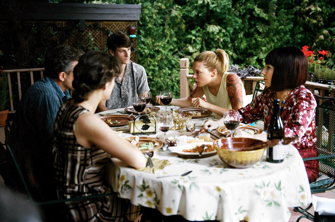
The plot of Juste la Fin du Monde (It’s Only the End of the World), the latest film by French-Canadian director Xavier Dolan, feels more appropriate to the last two decades of the 20th century than to 2016. Not surprising, since Dolan drew inspiration from the 1990 play of the same name by Jean-Luc Lagarce, who died of an AIDS-related illness in 1995.
The film focuses on the terminally ill 34-year-old Louis, a successful writer who returns after 12 years to the French village of his childhood to announce his impending death to his family. This narrative was rehearsed in many artistic forms at the time when HIV almost certainly meant a death sentence, but it seems an odd choice of subject for the current wunderkind or enfant terrible (depending on your opinion of Dolan’s highly stylized movies) now that medical breakthroughs mercifully have made the condition treatable.
Even though It’s Only the End of the World has polarized critical opinion since its screening at this year’s Cannes Film Festival, I for one am pleased that Dolan chose this subject, since he has elicited superlative performances from what can only be called the A List of French acting talent.
Nathalie Baye as Louis’s widowed mother is magnificent and touching at the same time; the fact that she chooses to remain seated blow-drying her newly painted fingernails when Louis first enters the house points to both her self-absorption and her inability to deal with the fact that Louis has chosen to abandon his family for over a decade, aside from sending the occasional postcard.
These complex feelings are shared in differing ways by the whole family. Vincent Cassel as Louis’s older brother Antoine, a tool-maker, perfectly captures the resentment and anger of someone who on the surface has been much less successful than his younger sibling and who bullies his frightened, inarticulate wife, Catherine (yet another extraordinary performance by Marion Cotillard, surely one of the most versatile actors working today). Léa Seydoux as Louis’s wild-child of a sister, Suzanne, is volcanic and loving toward the brother she has never really known.
Gaspard Ulliel’s performance as Louis is matchless. He speaks very little but controls the screen. The extreme closeups of his face display every nuance of reaction as he surveys the hell unleashed in his family by his return and as he tries to contain the grief of his as-yet-unannounced death.
Unlike some of Dolan’s enervatingly self-regarding earlier films, this one is certainly a triumph of substance over style, moving forward from the positive signs seen in his previous movie Mommy. Some of his stylistic tics are still evident, especially his love of slow-motion shots, but this time even they feel integral to the work.
Some critics have spoken of the almost unbearable shouting matches that take place in this film (as in Mommy), but I found the modulations of tone captivating and remarkably concise. And I loved the fact that there was no grand epiphany, which is usually a requirement in such family dramas.
Most movies these days seem to overstay their welcome by about 30 minutes, but this raw, complex and touching foray into a dysfunctional family’s life had the rare effect of leaving me yearning for more.
Favorite